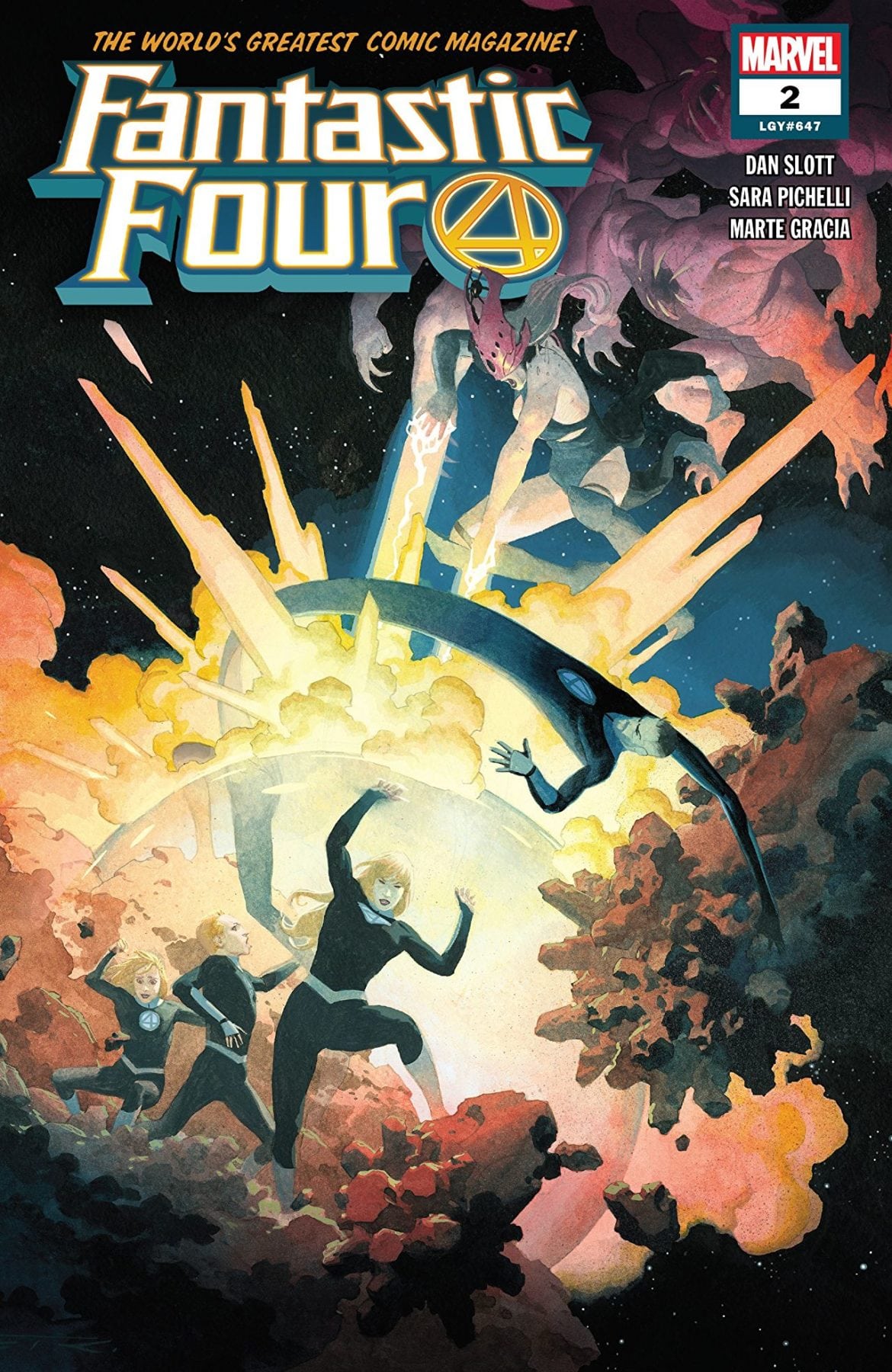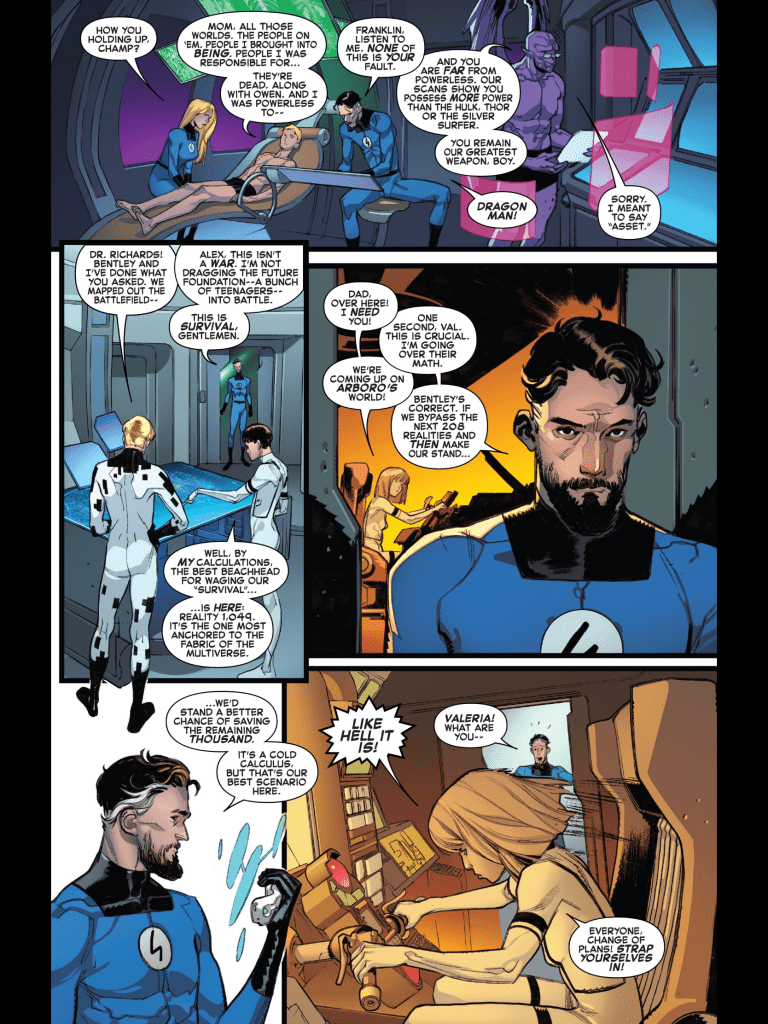Happy Belated Fantastic Four Day! Fifty-nine years ago this week Fantastic Four #1 hit the stands and to quote Aunt Petunia’s favorite nephew, “Nuthin’ was ever gonna be quite the same again.” The Fantastic Four is one of those things that I’ve liked as long as I remember. As a kid, I knew them first from their 1967 animated series. I don’t remember it that well; (it’s not like we form a lot of detailed memories when we’re three), but I liked it. Here are three personal firsts that are related to the Fantastic Four to mark the anniversary.
My First Fantastic Four Comic

The first Fantastic Four comic I remember buying was Fantastic Four #126 (September 1972). This was about a year before I decided I was “officially” collecting comics; I was getting comics pretty sporadically at the time. But what an amazing place to start! Inside, the title is “The Way It Began!” and the cover is a stunning recreation of Kirby’s cover to FF#1 drawn by the inimitable team of John Buscema and Joe Sinnott. This comic defined my mental picture of the FF for all time.
The story is good as well. Initially, Roy Thomas treats us to the standard flavor of family brouhaha with which Lee and Kirby brilliantly began so many issues. Reed tinkers and then does the absent-minded-professor thing. Ben and Johnny bicker. Sue tries to keep things on track. Also Alicia. Classic. This leads us into a framing sequence where Ben is reminiscing using Reed’s thought-projector helmet which does exactly what one would expect a thought-projector helmet to do.

Ben then narrates a shortened version of the origin from FF #1, which ends with the iconic image below. I expect that many copies of this issue are missing this page; it’s one of the quintessential team pin-ups.

Short summaries of the team’s first encounter with the Mole Man and the Mole Man story from issues 88-90 follow. In that last story, the Mole Man uses a device that blinds the team and Ben has an epiphany. If the Mole Man’s device can blind and cure the team, maybe he can use it to cure Alicia’s blindness. He storms off intending to help her.
After a year or two, FF #126 was made into one of those Power Records sets with the recorded dialogue. If Johnny’s voice sounds familiar, that’s Peter Fernandez, aka Speed Racer! (The “!” may be obligatory). Thanks to the magic of YouTube, you can experience the entire issue with the dialogue abbreviated somewhat here.
My First Blog Post.

Two years ago Marvel published a facsimile edition of Fantastic Four #1, part of the promotion for the latest series of Fantastic Four that started shortly thereafter. That seemed like a big deal at the time. “The World’s Greatest Comix Magazine” had been off the market since April 2015 because some executive at Marvel was having a pissing match with 21st Century Fox and didn’t want to do anything to promote Fox’s latest FF movie including publishing their own flagship title.
Anyway, I’d wanted to review the Facsimile edition. I’d previously done some short reviews that I posted on Facebook, like this one and this one here, but a Facebook post was utterly unsuitable for what I wanted to do for the Facsimile edition. I wrote All In Color for Forty Dimes and a week or so later I had a blog. This blog.
My First Fan Letter

The letter itself is pretty self-explanatory. It wasn’t printed because as I now realize it’s much too long. For your edification, an open letter to Dan Slott, referencing Fantastic Four (2018) #2. What do you need to know about the book to appreciate the letter? Not too much. This is the first time we’ve seen Reed, Sue, and the kids since Secret Wars. They, along with Molecule Man and the Future Foundation have been rebuilding the multiverse one universe at a time. Franklin rebuilds the universes and then the group explores them; they’ve been at it for five years or so and time seems to have passed more quickly for them than it has on Earth. Franklin and Valeria are teenagers.
At some point, Franklin loses the ability to create universes. Evidently, all is now right with the multiverse; Franklin is done.
And the “Multiverse” has to fight back as the personification of one of the fundamental forces of nature.

Confrontation commences. It’s not pretty. Then this.

You can read the rest for yourself; here’s my letter.
Dear Dan,
Fantastic Four has been my favorite comic for almost forty years. I’m thrilled to have Fantastic Four back on the spinner racks; the Marvel Universe doesn’t work correctly without its first family. When I heard that you’d be helming the book, I was pleased. You always seemed to have a good understanding of the characters; from their guest appearances in Amazing Spider-Man, to your 8-issues on The Thing and everything in between.
Issue 1 was an unadulterated pleasure. I also really enjoyed issue 2, but there was one false note I’d like to address.
Reed is a tricky character to write; this was never more evident than in Civil War. Tony is an engineer who thinks pragmatically. His position in Civil War made sense. Reed by contrast thinks like an academic working forward from first principles. He has strong sense of right and wrong. He should have been the first person to come over to Cap’s side, rather than the last. Reed’s characterization in that series is wildly off the mark, it’s almost closer to Victor than it is to Reed. Civil War 2, incidentally, showed us how necessary the Four are to the Marvel Universe. In that series, Reed was the person we needed to refute Carol’s arguments, but Reed was unavailable.
So what didn’t ring true in FF #647/2? That Reed would bypass 208 realities teeming with life to secure a better chance of saving the rest. Reed decides things based on principles, not pragmatics. When Galactus lay dying, it was Reed who insisted on saving him despite the risk; Tony, the pragmatist, was overruled. Reed is confident; he strode into the afterlife without hesitation to save Ben. We see this confidence after the Future Foundation was routed by the Griever. It should have been evident before then. Reed doesn’t make tactical retreats nor does he take the easy way out. In the Galactus Trilogy, a tactical decision might have been to try to quickly develop a way to preserve some life, while Galactus consumed the Earth’s energy. Instead Reed confronted Galactus with the Ultimate Nullifier. A riskier decision, but one that preserved virtually all life on Earth.
I hope this is helpful. Aside from this, these first two issues were like a trip home. You have to be careful writing Reed. When you start pulling parts out of what makes him Mr. Fantastic, you could end up with the Maker and that would be a travesty.
Joseph F. Kolacinski
Horseheads, NY
Reed’s characterization has been hit-or-miss for a while; at least since Civil War. One of those posts that’s been waiting in the wings is called “Writing Reed Right,” but that’s a big undertaking. I don’t even have a guess as to when that might be finished.
Where’s a thought-projection helmet when you need one? I hope you enjoyed my reminiscences. We’re now on a twelve-month countdown to the 60th anniversary. We’ll need something pretty big for that. Any suggestions? Do you remember your first Fantastic Four comic? Let us know in the comments!


Thanks for this. The FF are some of my favorites in the Marvel Universe and you understand what makes them tick. Have you considered trying to write for the comic?
LikeLiked by 1 person
Thanks, that’s high praise. Long ago, my friend Adam and I knocked out a plot for one issue that I was pretty happy with. Sadly, whatever talent I might have once had for writing fiction has long since atrophied.
LikeLike
I had that Power Records version of “The Way It Began.” It played it a lot. I became a fan of comics through the FF and it was issue #157 or thereabouts. I think your characterization of Reed is spot on. Even though he doesn’t wear a mask, he would want to protect families and loved ones. He also viewed the Negative Zone as very hostile and would have never ever built a prison there. Maybe the microverse, but never the Negative Zone. He also would have never participated in cloning Thor. Reed Richards of the Civil War is not Reed Richards. He would always make a sacrafice for others…and would not have abandoned any universe. Good work!
LikeLiked by 1 person
You make an excellent point about Reed’s stand on the Negative Zone; you’re absolutely right, but I hadn’t thought about that.
An interesting thing about Reed in Civil War is that I don’t even think Dwayne McDuffie (who was writing FF at the time) bought into that characterization. If you read FF #542 it reads like McDuffie dancing as fast as he can to make Reed’s stand in Civil War make sense. It’s probably as well as it could have been done, but it doesn’t work.
Thanks for the comment!
LikeLike